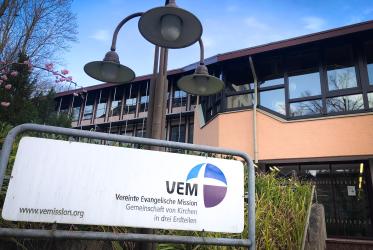Statement adopted by the WCC Central Committee, Geneva, 15-21 February, 2005
The World Council of Churches has addressed the issue of the rights of Indigenous
Peoples since the 1980s. It has monitored and supported the work of the special
working group on Indigenous Peoples within the United Nations system including
the drafting process of the United Nations Declaration on the Rights of
Indigenous Peoples.
The World Council of Churches remains committed to the Declaration on the
Rights of Indigenous Peoples that represents the minimum standards for the survival
of Indigenous Peoples with dignity. The WCC Central Committee Statement
in Geneva, July 1982, appealed to member churches, amongst others, to listen
and learn from the Indigenous Peoples in order to deepen Christian understanding
of (and solidarity with) their legal rights, their political situations, their cultural
achievements and aspirations and their spiritual convictions. It further called
on the churches to become politically involved on the side of the Indigenous
Peoples and join the struggle against those powers and principalities which seek
to deny the land rights and human rights of Indigenous Peoples.
The Seventh WCC Assembly Statement in Canberra, 1991, on Indigenous Peoples
and Land Rights called upon member churches to move beyond words to action,
specifically: to negotiate with Indigenous Peoples to ascertain how lands taken
unjustly from them by churches can be returned; to recognize, acknowledge and
vigorously support the right of self determination and sovereignty of the Indigenous
Peoples, and to use their influence with governments and international bodies
actively to seek the goal of justice through sovereignty and self-determination of
Indigenous Peoples.
While the Council, over the years, has addressed various aspects relating to the
rights of the Indigenous Peoples it has not spoken clearly on the issue of their
languages.
The World Council of Churches is aware of its responsibility to care for human
life and is concerned by the global phenomena of loss of the world's languages.
According to the figures put out by UNESCO, on average one of the world's languages
is lost every two weeks. It is estimated that up to 90 percent of the world's
6,700 languages will become extinct by the end of the century. Indigenous languages
carry critical knowledge about how to maintain bio-diversity in the given
place of the community and thus can provide means to sustain life on the planet.
Increasingly, scholars are recognizing the critical link between linguistic diversity
and bio-diversity acknowledging an analogous relationship between the two.
The mission history of the churches has many ambiguities, one of which is in relation
to Indigenous Peoples' languages. In many instances Bible translation has
helped to preserve and develop indigenous language, while in others the policy
of the use of colonial language has had an adverse impact.
There is a need to revitalize the world's indigenous languages with respect to the
cultural, intellectual and spiritual diversity of humankind. These languages carry
a storehouse of indigenous knowledge, accrued and refined over millennia - knowledge
essential for understanding local ecosystems, medicinal use of plants, specialized
agronomies and careful adaptations to regional environments.
In view of the need to protect the rights of Indigenous Peoples, particularly their
languages, the WCC Central Committee meeting in Geneva, February 15-22,
2005, reiterates its support for the right of self-determination and sovereignty of
Indigenous Peoples as they are defined in church and society and calls upon member
churches:
- to urge the establishment of a UN International Year of Indigenous Languages
in 2006 or a subsequent year;
- to appeal to their governments to remove discriminatory laws against
indigenous languages, to work towards removing the layers of educational
and social pressures arrayed against indigenous languages, and to actively
pursue compliance with international conventions and treaties that regard
the use of the language of heritage as a basic human right;
- to challenge NGOs and foundations concerned with indigenous issues to
raise as the highest priority the need to protect the global linguistic diversity
through offering funding and structural support as communities around
the world seek to keep alive the heart of their ancient traditions through
their Indigenous languages;
- to remind churches and the Christian community of the diversity of spoken
languages as a sign of the presence of the fullness of the Spirit of God
in Acts 2 and the full diversity of languages as an integral part of the vision
of worship in the presence of God in Revelation 7:9;
- to continue to support language-based services and activities, especially
scripture translation with member societies of the United Bible Society
which is currently translating into 500 to 600 languages, providing an
important catalyst for language stabilization and development;
- toencourage reflection on their role and possible complicity in patterns of
cultural repression through boarding schools for indigenous children or
other agencies and processes;
- to request churches to consider practical ways in which they can respond
to this world-wide crisis, calling attention to the critical issue of language
loss and working towards remedies both in their local areas and at international
level;
- to call on member states of the United Nations to resolve their outstanding
differences and disagreements to pave the way for the signing of the
United Nations Declaration on the Rights of Indigenous Peoples which
specifically protects indigenous language rights;
- to call also on all states with indigenous populations to sign and ratify the
ILO's 1989 Indigenous and Tribal Peoples Convention No. 169 which includes
indigenous language rights in Articles 28 and 30.





